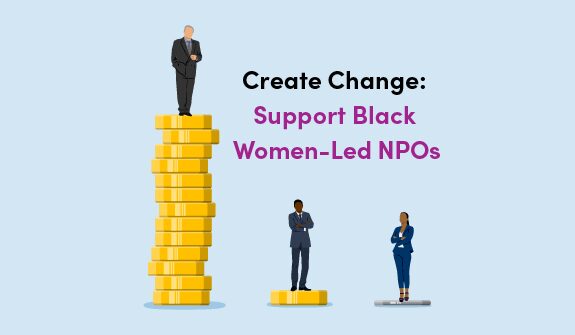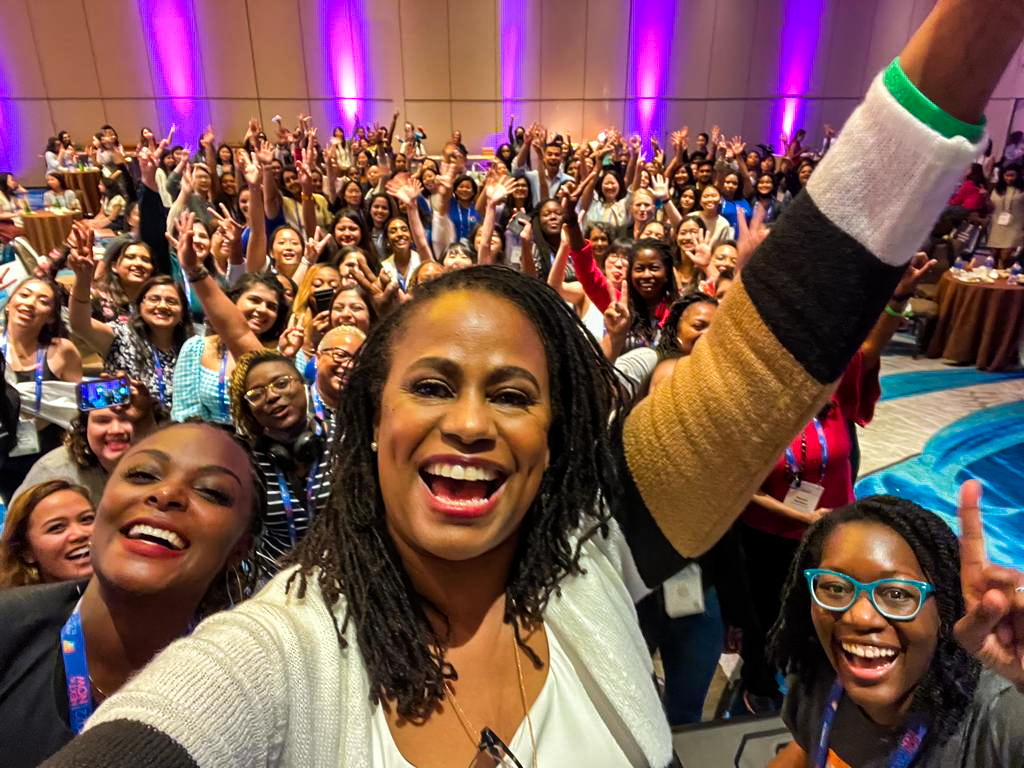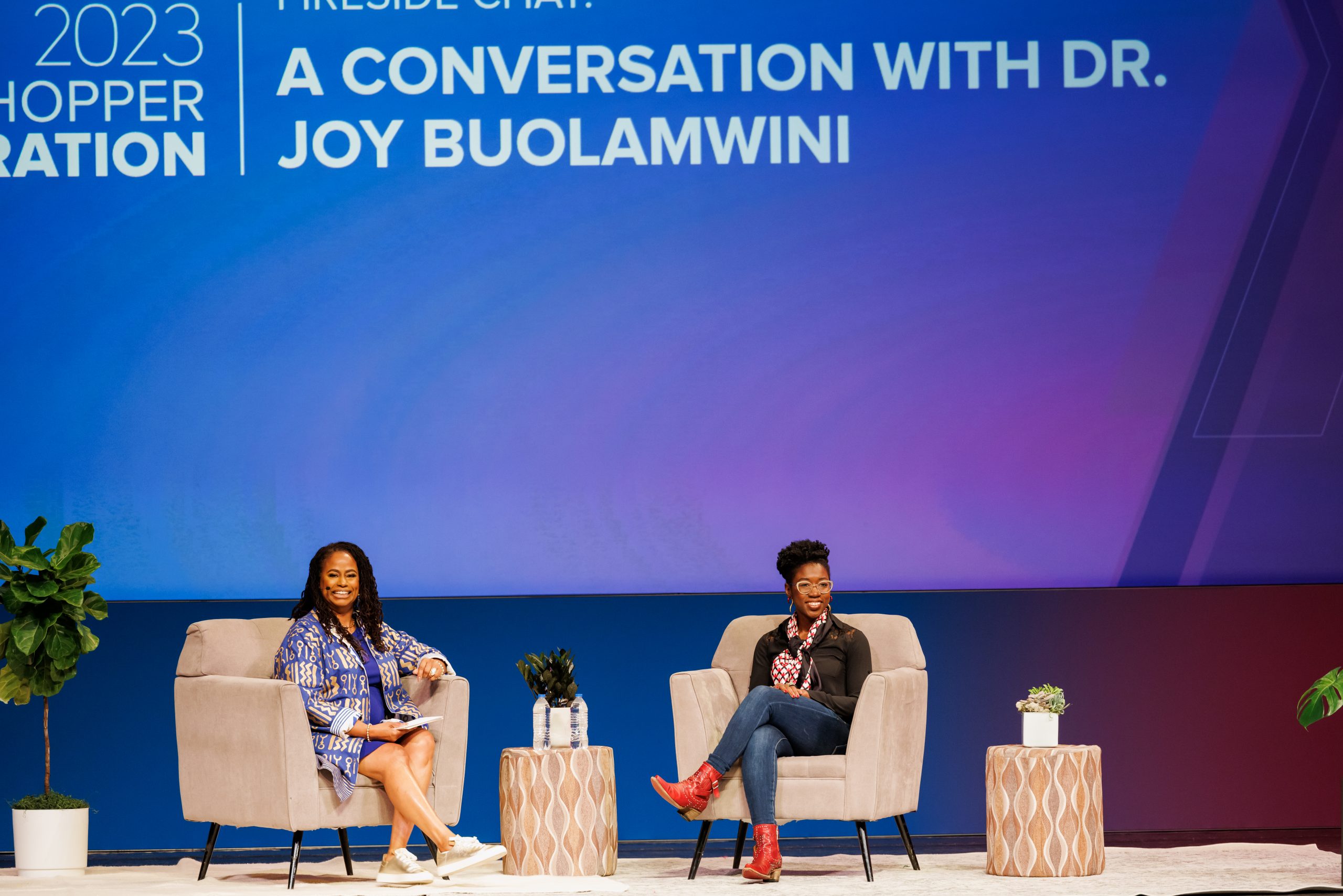Written by Brenda Darden Wilkerson
Imagine the last time you made a charitable gift. Why did you choose that particular organization? How did you feel? Were you drawn to the mission, the impact of the organization, or a personal connection to the cause? Lifting up those who are making an impact in our society feels good, doesn’t it? Especially as we head into the holidays and shift our mindset to friends, family, and community, we need these moments of connection and hope to fuel ourselves for the year ahead.
The State of the Nonprofit Sector & Giving
Now consider the vastness of the nonprofit sector, with 1.54M nonprofits1 registered in the United States and nonprofit jobs accounting for 10% of the workforce.2 The enormous challenge of sustaining this vital industry rests on the ability of leaders like me to fundraise, from kind and generous people like you. The problem that I and other NPO leaders face is the system of charitable giving is under pressure, because it’s never been set up for equitable outcomes. Giving has become more concentrated over time and recently started to decline for the first time since 2009.3 This is concerning. And rather than remaining silent I wanted to speak directly to you, the giver. This blog post is a call to action to breathe new life into charitable giving and to correct the systemic disparities that have always existed. This is a call to bring support to Black women-led nonprofit organizations (NPOs) to receive the resources needed to move missions forward and truly drive change.
In the wake of the 2020 movement toward racial justice, significant awareness was brought to the lack of Venture Capital funding BIPOC folks receive, particularly women of color. I recently had a conversation with my friend Arlan Hamilton on our Podcast “B the Way Forward” on this very topic. The stark reality, a few years later, is although there’s more awareness in for-profit funding disparity, there’s still significant action and change needed and a fight ahead against the forces that seek to maintain the status quo.
What many people don’t realize is the very same reality exists in philanthropy and social impact. There is a funding gap between White-led and Black-led NPOs, even without breaking it down to Black women-led NPOs. In 2019, $450 billion was donated by Americans in the philanthropy space. That’s a significant amount of dollars with an even more significant impact behind it. Of that $450 billion, 4% went to Black, Indigenous, or Latinx-led NPOs.4 This means that even less than 4% was donated to organizations led by Black, Indigenous, or Latinx women.
Supporting Black women-led NPOs stands out as a powerful and imperative opportunity for creating positive change. These organizations, often rooted in communities and driven by a unique set of lived experiences, play a pivotal role in addressing societal challenges and advancing social justice especially for those groups who face a consistent lack of access to critical resources.
In my days of founding CS for All in Chicago, I would see other organizations receive funding in far greater amounts. Meanwhile, I couldn’t get enough money to cover salaries or provide additional support to the teachers. Every dollar I raised went to training and development, despite not having enough funding secured to cover general operations. And let me tell you as an NPO operator, unrestricted funding dollars are the ones we need most. Sadly, this story – my story – isn’t uncommon. It was and continues to be the reality for many NPO women leaders of color. Research conducted by Bridgespan and Echoing Green found that White-led organizations retained budgets 24% larger than those led by Black, Indigenous, and people of color. And not only were Black women-led organizations granted the least funding, unrestricted funds for leaders of color were 76% smaller.5 Honestly, these numbers are hard for me to reconcile. Though I and other leaders like me are committed and dedicate our lives to making a change, without funding, how can we? To this day, I think about how much more I could have done, how many more I could have helped, if only I had access to unrestricted dollars through equitable philanthropy.
The stark truth is that, relatively speaking, very few high-net-worth philanthropists are Black women. Understandably, people are often motivated to give to organizations based on their personal experience with the cause. So, it’s no surprise that 86.5% of Black-led nonprofits say they always or often have trouble accessing a large, diverse number of funding sources.6 My hope is to encourage philanthropists to look at their giving plans in detail and be more intersectional in their approach to giving. We will only advance society if we support all populations; otherwise, imbalanced support will continue to drive the wedge of inequality through our communities.
We Are the Many…Not the Few
There are many amazing organizations, led by phenomenal Black women, working to address some of society’s greatest issues. These are human issues; things that are right at the heartbeat of society. And more times than not, these leaders are intimately familiar with these issues. They’ve experienced them firsthand. I’ve met some of these leaders. I’ve worked with some of these leaders. And I deeply respect these leaders and the impact they make.
Dr. Joy Buolamwini – Her nonprofit, Algorithmic Justice League, is on a mission to raise public awareness about the impacts of AI, equip advocates with resources to bolster campaigns, build the voice and choice of the most impacted communities, and galvanize researchers, policymakers, and industry practitioners to prevent AI harm.
Nadine Smith – Nadine serves as Executive Director of Equality Florida, Florida’s statewide civil rights organization dedicated to securing full equality for Florida’s lesbian, gay, bisexual, transgender, and queer (LGBTQ) community.
Timnit Gebru – Timnit founded The Distributed AI Research Institute (DAIR), an interdisciplinary and globally distributed AI research institute rooted in the belief that AI is not inevitable, its harms are preventable, and when its production and deployment include diverse perspectives and deliberate processes it can be beneficial.
Kimberle Crenshaw – Kimberle, who coined the term “intersectionality,” co-founded The African American Policy Forum, an innovative think tank that connects academics, activists, and policymakers to promote efforts to dismantle structural inequality.
Kelley Robinson – Kelley is the ninth president of the Human Rights Campaign, American’s largest civil rights organization working to achieve equality and liberation for lesbian, gay, bisexual, transgender, and queer people.
Dorri McWhorter – Dorri currently serves as President and CEO of the YMCA of Metropolitan Chicago. The YMCA of Metro Chicago is committed to strengthening community by connecting all people to their purpose, potential, and each other.
These named and more are recognizing needs, bridging the gaps, and doing great work – lifechanging work – and not getting an equitable share of the billions of dollars of the philanthropic pie.
As the leader of AnitaB.org, a global nonprofit with the goal of intersectional gender equity and pay parity in the tech ecosystem, I can attest that we and other NPOs like those mentioned above cannot operate without philanthropy.
AnitaB.org & Our Impact
With programs that touch on policy and advocacy, workforce advancement, global events, membership and much more, my organization’s goals are lofty and our impact, while great, could be so much greater. We talk about scalable projects; we’re not talking about some small impact.
Apprenticeship Pathway Program (APP) – The AnitaB.org Apprenticeship Pathway Program is a core leadership pipeline that advances a diverse, inclusive, and equitable tech workforce, by partnering with companies that provide technical upskilling, professional development, and on-the-job experience through our immersive apprenticeship cohorts. We recruit top candidates with a focus on historically excluded communities of Black, Latinx, Indigenous, Pacific Islander, LGBTQIA+, women, and non-binary people, providing the opportunity for increased annual income, career support, and zero student debt. This “learn and earn” model offers participants rapid economic mobility and much more, including a key objective to launch their careers by landing a full-time role in tech.
Grace Hopper Celebration (GHC) – Grace Hopper Celebration is the AnitaB.org flagship event and the world’s largest gathering of women and non-binary technologists. GHC aims to inspire and empower, advocating for diversity, inclusivity, equality, and belonging in the technology sector. Founded in 1994 to honor the pioneering work of tech luminary Rear Admiral Grace Murray Hopper, GHC attracts attendees from around the world who come to learn, network, and celebrate achievements. GHC 24 will be held October 8-11 in Philadelphia, PA.
AnitaB.org Membership – Our AnitaB.org Membership program, made up of 106k+ Members, is specifically designed to support women and non-binary technologists throughout their tech journey. Members have access to networking opportunities, career resources, mentorship, community support, and a platform for open discussion, helping to elevate their professional profile and advance their career in technology.
Policy & Advocacy – The AnitaB.org Policy and Advocacy team sets priorities, including pay equity, ending discrimination and harassment, and careful development of emerging technologies, and builds opportunities to engage AnitaB.org Members and other key stakeholders to support efforts to achieve those priorities. We envision a regulatory and legal environment that furthers the mission of AnitaB.org, and we engage Members, partners, policymakers, and other stakeholders to advance women and non-binary people in technology through government programs, partnerships, and interventions aimed at achieving equity.
Innovative Offerings – We’re developing bespoke DEI consultation; we’re building out a product department, and we’re going to lean into innovation.
Our work on the DEI front is moving the needle for women and non-binary folks, especially right here in the United States. But our ambition does not stop there. What if we were to drive a global movement of economic empowerment via equitable tech careers beyond the US? Imagine what change and impact your giving could bring about.
Let me paint a picture for you, using another personal example via AnitaB.org India, to resolve the disparity faced by women and non-binary technologists. AnitaB.org India is an extension of the work we do globally to address these inequities.
As of 2020, “The Women in Tech” report by AIM Research found that of the 4.6 million employees in India working in tech, only 1.3 million (29%) were women.7 Even more striking, is the fact that as you go up the ladder, that 29% drops to an abysmal 14% at the C Suite level.8 And when you layer in an additional intersectional identity of being non-binary, due to fear of retaliation and further discrimination, AIM Research was unable to gather reliable results. Imagine not being able to truly live in your personhood because you possess a particular identity. And that is why how and where you give matters.
Give the Gifts of Access, Opportunity, & Empowerment
So, when you consider AnitaB.org and AnitaB.org India or organizations like ours, your gift is more than just a gift. It’s access. It’s an opportunity. It’s a catalyst for economic empowerment. It’s freedom. So simply put, we need you to come along with us. Having consistent and equal funding is key to being able to be agile and innovative around the increasingly challenging needs of the societies we support. We’re committed to working with philanthropists on intersectional trust-based giving. Let us help you think through your diversity, equity, and inclusion goals or strategies to guide your philanthropic giving and ensure all parts of society rise together.
Let me put it this way, at the end of the day it comes down to what you value. Supporting Black women-led NPOs is not just an act of philanthropy; it is an investment in a more just, equitable, and vibrant future. We bring unique perspectives, tailored solutions, and a commitment to dismantling systemic barriers. By supporting us, YOU become agents of positive change, contributing to a society where every individual has the opportunity to thrive, irrespective of their background. Recognize the importance of these leaders and these organizations, and work together to amplify our impact, creating a world that truly reflects the diversity and strength of its people.
Women Supporting Women & Creating Change
And while the main point of writing this blog is to reach philanthropists of all genders, races, levels, and interests, I write also to ALL women. The lived experiences and the lens that Black women see the world through are vital to seeing and BEING the way forward. It’s important that we support each other as we continue to navigate and innovate in the sector in which we work. Our missions and our impact are far too critical to not stand in this space, in this time, together. To my white women colleagues, your solidarity and reciprocity in this call to action is needed. This is heart work for me, and I know that it’s heart work for you as well. Let’s create change together.
About Brenda Darden Wilkerson
Brenda Darden Wilkerson is an advocate for access, opportunity, and social justice for underrepresented communities in technology. She currently serves as the President and CEO of AnitaB.org, an organization that connects, inspires, and strives for greater equality for women technologists in business, academia, and government. She founded the original Computer Science for All program, building computer science classes into the curriculum for every student in the Chicago Public Schools, and serving as the inspiration for the Obama administration’s national CS For All initiatives.
Brenda was named to the 2023 Forbes 50 Over 50 list for Impact. The third annual list is a collection of founders, innovators, and creators and is divided into four broad categories – Innovation, Impact, Investment, and Lifestyle. The women on the 50 Over 50 Impact list are leading the charge for a better world. See her profile here.
Sources
1. [ Nonprofit organizations in the U.S. – Statistics & Facts by Statista ]↩
2. [ How many people are employed in the U.S. nonprofit sector? – Candid. Learning ]↩
3. [ National Council of Nonprofits – It’s Real: Charitable Giving Plummeted Last Year ]↩
4. [ Why Give Black? Closing the Giving Gap Matters by Charity Navigator ]↩
5. [ Racial Equity and Philanthropy: Disparities in Funding for Leaders of Color Leave Impact on the Table ]↩
6. [ Grassroots, Black & Giving – How Philanthropy Can Better Support Black-Led and Black-Benefiting Nonprofits, by the Young Black and Giving Back Institute ]↩
7. [ Indian Tech is Still Oblivious to Gender Inclusivity ]↩
8. [ The Times of India – Why the gender gap is worse in STEM ]↩
Read more posts from the thread Empowering Equity in Philanthropy: A Technological Revolution with AnitaB.org and Endaoment



